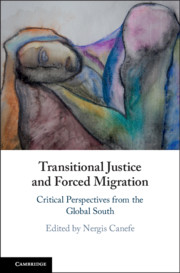Book contents
- Transitional Justice and Forced Migration
- Transitional Justice and Forced Migration
- Copyright page
- Dedication
- Contents
- Contributors
- Preface
- Acknowledgements
- Abbreviations
- In Lieu of an Introduction
- Part I The Past as the Memory of the Future
- Part II Law, Justice, and Hope
- 4 Transitional Justice, Displacement, and the Rights of the Young
- 5 Beyond Agreements
- 6 State-Based Truth Commissions
- 7 The Right of Return in Iraq
- Part III Ethics of Witnessing
- Index
- References
6 - State-Based Truth Commissions
The Case of Postwar Sri Lanka
from Part II - Law, Justice, and Hope
Published online by Cambridge University Press: 24 October 2019
- Transitional Justice and Forced Migration
- Transitional Justice and Forced Migration
- Copyright page
- Dedication
- Contents
- Contributors
- Preface
- Acknowledgements
- Abbreviations
- In Lieu of an Introduction
- Part I The Past as the Memory of the Future
- Part II Law, Justice, and Hope
- 4 Transitional Justice, Displacement, and the Rights of the Young
- 5 Beyond Agreements
- 6 State-Based Truth Commissions
- 7 The Right of Return in Iraq
- Part III Ethics of Witnessing
- Index
- References
Summary
This chapter illustrates the role state-based truth commissions have in postwar nation-building when they are conducted during the resettlement of those who were forcibly displaced during the conflict. By drawing on the case of Sri Lanka, I examine transcripts of testimonies made to the “Lessons Learnt and Reconciliation Commission” (LLRC) during the commission’s field visits to war-affected communities in the Northern Province. The historical moment in which the LLRC took place was during the resettlement of Tamils who were displaced during the final stages of the war. This chapter examines the role of the Commission in the process of resettling those who were forcibly displaced by war, and what I suggest being the forced “placement” of Tamil war survivors into the postwar Sri Lankan nation-state.
- Type
- Chapter
- Information
- Transitional Justice and Forced MigrationCritical Perspectives from the Global South, pp. 135 - 157Publisher: Cambridge University PressPrint publication year: 2019
References
- 1
- Cited by



